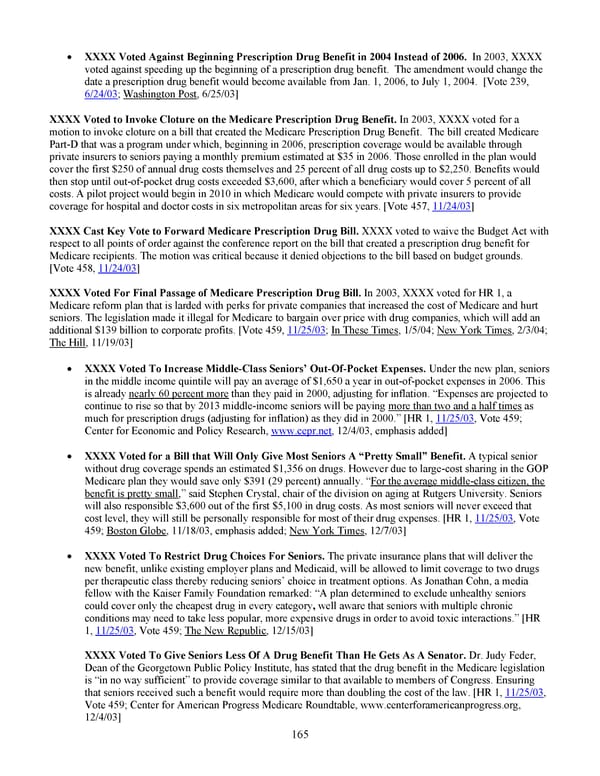XXXX Voted Against Beginning Prescription Drug Benefit in 2004 Instead of 2006. In 2003, XXXX voted against speeding up the beginning of a prescription drug benefit. The amendment would change the date a prescription drug benefit would become available from Jan. 1, 2006, to July 1, 2004. [Vote 239, 6/24/03; Washington Post, 6/25/03] XXXX Voted to Invoke Cloture on the Medicare Prescription Drug Benefit. In 2003, XXXX voted for a motion to invoke cloture on a bill that created the Medicare Prescription Drug Benefit. The bill created Medicare Part-D that was a program under which, beginning in 2006, prescription coverage would be available through private insurers to seniors paying a monthly premium estimated at $35 in 2006. Those enrolled in the plan would cover the first $250 of annual drug costs themselves and 25 percent of all drug costs up to $2,250. Benefits would then stop until out-of-pocket drug costs exceeded $3,600, after which a beneficiary would cover 5 percent of all costs. A pilot project would begin in 2010 in which Medicare would compete with private insurers to provide coverage for hospital and doctor costs in six metropolitan areas for six years. [Vote 457, 11/24/03] XXXX Cast Key Vote to Forward Medicare Prescription Drug Bill. XXXX voted to waive the Budget Act with respect to all points of order against the conference report on the bill that created a prescription drug benefit for Medicare recipients. The motion was critical because it denied objections to the bill based on budget grounds. [Vote 458, 11/24/03] XXXX Voted For Final Passage of Medicare Prescription Drug Bill. In 2003, XXXX voted for HR 1, a Medicare reform plan that is larded with perks for private companies that increased the cost of Medicare and hurt seniors. The legislation made it illegal for Medicare to bargain over price with drug companies, which will add an additional $139 billion to corporate profits. [Vote 459, 11/25/03; In These Times, 1/5/04; New York Times, 2/3/04; The Hill, 11/19/03] XXXX Voted To Increase Middle-Class Seniors’ Out-Of-Pocket Expenses. Under the new plan, seniors in the middle income quintile will pay an average of $1,650 a year in out-of-pocket expenses in 2006. This is already nearly 60 percent more than they paid in 2000, adjusting for inflation. “Expenses are projected to continue to rise so that by 2013 middle-income seniors will be paying more than two and a half times as much for prescription drugs (adjusting for inflation) as they did in 2000.” [HR 1, 11/25/03, Vote 459; Center for Economic and Policy Research, www.cepr.net, 12/4/03, emphasis added] XXXX Voted for a Bill that Will Only Give Most Seniors A “Pretty Small” Benefit. A typical senior without drug coverage spends an estimated $1,356 on drugs. However due to large-cost sharing in the GOP Medicare plan they would save only $391 (29 percent) annually. “For the average middle-class citizen, the benefit is pretty small,” said Stephen Crystal, chair of the division on aging at Rutgers University. Seniors will also responsible $3,600 out of the first $5,100 in drug costs. As most seniors will never exceed that cost level, they will still be personally responsible for most of their drug expenses. [HR 1, 11/25/03, Vote 459; Boston Globe, 11/18/03, emphasis added; New York Times, 12/7/03] XXXX Voted To Restrict Drug Choices For Seniors. The private insurance plans that will deliver the new benefit, unlike existing employer plans and Medicaid, will be allowed to limit coverage to two drugs per therapeutic class thereby reducing seniors’ choice in treatment options. As Jonathan Cohn, a media fellow with the Kaiser Family Foundation remarked: “A plan determined to exclude unhealthy seniors could cover only the cheapest drug in every category, well aware that seniors with multiple chronic conditions may need to take less popular, more expensive drugs in order to avoid toxic interactions.” [HR 1, 11/25/03, Vote 459; The New Republic, 12/15/03] XXXX Voted To Give Seniors Less Of A Drug Benefit Than He Gets As A Senator. Dr. Judy Feder, Dean of the Georgetown Public Policy Institute, has stated that the drug benefit in the Medicare legislation is “in no way sufficient” to provide coverage similar to that available to members of Congress. Ensuring that seniors received such a benefit would require more than doubling the cost of the law. [HR 1, 11/25/03, Vote 459; Center for American Progress Medicare Roundtable, www.centerforamericanprogress.org, 12/4/03] 165
 HRC vote skeleton Page 178 Page 180
HRC vote skeleton Page 178 Page 180